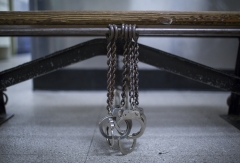
Featured is a prisoner bench with attached handcuffs. (Photo credit: Robert Nickelsberg/Getty Images)
Under new early-release legislation in Virginia, some inmates would serve only 54 percent of their sentence — that’s barely half.
The legislation is expected to pass Virginia’s House of Delegates, although it is unclear if it will pass the state senate. The changes are contained in HB 5148, which dramatically increases the sentence credits that inmates receive towards their release, if they behave in prison. Many violent criminals will be released if this legislation becomes law, because it applies retroactively, and applies to most murderers and rapists.
On Wednesday, the legislation passed the House Courts of Justice Committee by an 11-to-9 vote, with all Republicans voting “no,” and all but two Democrats voting “yes” (one Democrat voted “no,” and one abstained).
As the Virginia Progressive Legislative Alert Network notes, under the bill, “Someone serving a 5 year sentence would serve 64 percent of his sentence. Serving 10 years, 58 percent. Serving 20 years, 54 percent. (Assuming the person stays at level one the whole time).” It is citing legislative counsel’s description of the bill’s effects.
Effectively, inmates who have committed the more serious crimes will get the largest reductions in the time they spend in prison, because the longer you are in prison, the larger the sentence reduction you can get as a fraction of your sentence. For example, some inmates will receive 30 days credit off their sentences for every 30 days served, after being in prison for four years. As the legislation explains:
“For persons receiving Level I sentence credits, 13 days shall be deducted from the person’s sentence for every 30 days served. If the person maintains a Level I classification beyond one year consecutively, sentence credits shall be awarded as follows: (i) during the second year, 16 days shall be deducted for every 30 days served; (ii) during the third year, 20 days shall be deducted for every 30 days served; (iii) during the fourth year, 25 days shall be deducted for every 30 days served; and (iv) during the fifth year and any consecutive year thereafter, 30 days shall be deducted for every 30 days served.”
Even murderers and rapists can apparently benefit from the bill. The bill originally applied to all inmates, but it had to be amended slightly to pass the committee. It now excludes Class 1 murderers (but not most premeditated murderers) and certain sex offenders (but not most rapists). The excluded offenders can only receive the amount of good-behavior credits available under existing law, 4.5 days off their sentence for every 30 days they serve, not the much larger credits available under the bill, which reach 30 days off for every 30 days served.
This legislation would result in the early release of more violent criminals than a somewhat similar bill in the state Senate, SB 5034, which currently does not allow any murderers or rapists to benefit from its provisions. The sponsor of that senate bill attempted to amend it to allow many murderers to benefit from it, but a committee rejected that by an 8-to-7 vote. That Senate bill may yet be amended to cover more inmates, the way the House bill does.
The sponsor of the Senate bill has justified releasing inmates who behave earlier by saying Maryland has similar legislation. But Maryland also has a violent crime rate more than double Virginia’s. Maryland has a violent crime rate of 468.7 per 100,000 people, according to USA Today, compared to a violent crime rate of only 200 per 100,000 in Virginia.
Longer sentences deter crimes from being committed in the first place. Letting inmates out early just because they behave while in prison reduces this deterrent effect. Shortening sentences also makes it easier for criminals to get out and resume preying on potential victims. The National Bureau of Economic Research notes that longer sentences “reduce crime” by keeping inmates locked up and away from potential victims, citing research in the Journal of Law & Economics.
Forty years ago, Virginia’s Fairfax County had a similar crime rate to similarly prosperous Montgomery County, Md. But that changed after prison sentences got longer in Virginia, and Virginia eliminated parole. Fairfax County ended up with much less crime than Montgomery County.
In 2019, ABC’s channel 7 discussed how Montgomery County has twice the “violent crime rate” as “neighboring Fairfax County.” That was attributed to the fact “that the Maryland Judiciary is, generally speaking, more lenient on criminal defendants” and Virginia’s “harsh sentences,” which are “a huge deterrent” to crime.
Releasing career criminals early is harmful to our society and our economy. If not kept in prison, a career criminal can inflict hundreds of thousands of dollars of economic harm every year, far more than the cost of jailing that criminal. A 1998 study in the Journal of Quantitative Criminology estimated that there were “$165,000 in victim costs per year of a criminal’s career” for a typical “career criminal.”
Most of the inmates covered by HB 5148 will probably be violent criminals. In 2017, the Bureau of Justice Statistics found that 55 percent of state prison inmates in America were there for “violent offenses,” and only 15 percent for drug crimes (such as drug dealing and manufacturing).
It makes sense to give inmates good-behavior sentence credits as an incentive to behave in prison. But Virginia law’s current 4.5-day reduction for 30 days of good behavior is already incentive enough. HB 5148 would increase that reduction by an amount far more than what’s needed to provide an incentive to behave — up to 30 days off for every 30 days they behave, after being in prison for four years.
Such huge reductions are really a form of parole, not a mere incentive for good behavior. Virginia largely abolished parole in 1995, because it was unpopular and unwise to let criminals out of prison when they had not served most of their sentence.
Hans Bader practices law in Washington, D.C. After studying economics and history at the University of Virginia and law at Harvard, he practiced civil-rights, international-trade, and constitutional law. He also once worked in the Education Department.








